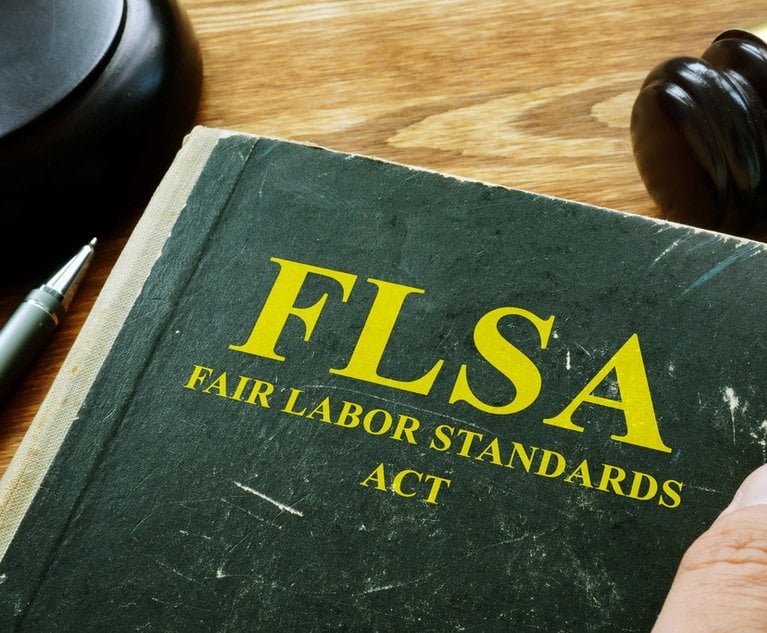 Andrea M. Kirshenbaum shareholder with Littler Mendelson. Courtesy photo
Andrea M. Kirshenbaum shareholder with Littler Mendelson. Courtesy photo High Court's Administrative Law Transformation and Its Impact on Federal Wage-and-Hour Law
This legal transformation is taking place at the same time that significant government regulations are being challenged, including the U.S. Department of Labor's final rules increasing the salary levels for the so-called "white collar" exemptions and classifying workers as independent contractors under the Fair Labor Standards Act as well as myriad other regulations issued by the Federal Trade Commission and National Labor Relations Board, just to name a few.
July 22, 2024 at 12:04 PM
6 minute read
By Andrea M. Kirshenbaum
As many prepare for summer getaways, the U.S. Supreme Court's 2023-24 term has left us with some not-so-light beach reading. Although much of the media focus has centered on the court overruling Chevron v. Natural Resources Defense Council in Loper Bright Enterprises v. Raimondo, that decision was part of a larger constellation of opinions that promises to reshape administrative law in the United States for decades to come. And this legal transformation is taking place at the same time that significant government regulations are being challenged, including the U.S. Department of Labor's final rules increasing the salary levels for the so-called "white collar" exemptions and classifying workers as independent contractors under the Fair Labor Standards Act as well as myriad other regulations issued by the Federal Trade Commission and National Labor Relations Board, just to name a few.
Relying on the Administrative Procedure Act (APA), Justice John Roberts writing for the six-justice majority in Loper Bright, reasoned that "courts, not agencies, will decide 'all relevant questions of law' arising on review of agency action." Going forward it will be the role of a court to discern a statute's "best meaning" by "deploying its full interpretive toolkit." Loper Bright instructs that "courts need not and under the APA may not defer to agency interpretation of the law simply because a statute is ambiguous."
This content has been archived. It is available through our partners, LexisNexis® and Bloomberg Law.
To view this content, please continue to their sites.
Not a Lexis Subscriber?
Subscribe Now
Not a Bloomberg Law Subscriber?
Subscribe Now
NOT FOR REPRINT
© 2025 ALM Global, LLC, All Rights Reserved. Request academic re-use from www.copyright.com. All other uses, submit a request to [email protected]. For more information visit Asset & Logo Licensing.
You Might Like
View All
Third Circuit's 'Johnson v. NCAA' Opinion: What It Means for College Athletics and Beyond
6 minute read
'Utterly Bewildering': GCs Struggle to Grasp Scattershot Nature of Law Firm Rate Hikes

Health Care Worker Files Class Action Against Staffing Agency for Unpaid Meal Breaks
4 minute readLaw Firms Mentioned
Trending Stories
- 1Trending Issues in Florida Construction Law That Attorneys Need to Be Aware Of
- 2The Importance of Judicial Elections
- 3Ephemeral Messaging Going Into 2025:The Messages May Vanish But Not The Preservation Obligations
- 4Decision of the Day: Trial Court's Sidestep of 'Batson' Deprived Defendant of Challenge to Jury Discrimination
- 5Is Your Law Firm Growing Fast Enough? Scale, Consolidation and Competition
Who Got The Work
J. Brugh Lower of Gibbons has entered an appearance for industrial equipment supplier Devco Corporation in a pending trademark infringement lawsuit. The suit, accusing the defendant of selling knock-off Graco products, was filed Dec. 18 in New Jersey District Court by Rivkin Radler on behalf of Graco Inc. and Graco Minnesota. The case, assigned to U.S. District Judge Zahid N. Quraishi, is 3:24-cv-11294, Graco Inc. et al v. Devco Corporation.
Who Got The Work
Rebecca Maller-Stein and Kent A. Yalowitz of Arnold & Porter Kaye Scholer have entered their appearances for Hanaco Venture Capital and its executives, Lior Prosor and David Frankel, in a pending securities lawsuit. The action, filed on Dec. 24 in New York Southern District Court by Zell, Aron & Co. on behalf of Goldeneye Advisors, accuses the defendants of negligently and fraudulently managing the plaintiff's $1 million investment. The case, assigned to U.S. District Judge Vernon S. Broderick, is 1:24-cv-09918, Goldeneye Advisors, LLC v. Hanaco Venture Capital, Ltd. et al.
Who Got The Work
Attorneys from A&O Shearman has stepped in as defense counsel for Toronto-Dominion Bank and other defendants in a pending securities class action. The suit, filed Dec. 11 in New York Southern District Court by Bleichmar Fonti & Auld, accuses the defendants of concealing the bank's 'pervasive' deficiencies in regards to its compliance with the Bank Secrecy Act and the quality of its anti-money laundering controls. The case, assigned to U.S. District Judge Arun Subramanian, is 1:24-cv-09445, Gonzalez v. The Toronto-Dominion Bank et al.
Who Got The Work
Crown Castle International, a Pennsylvania company providing shared communications infrastructure, has turned to Luke D. Wolf of Gordon Rees Scully Mansukhani to fend off a pending breach-of-contract lawsuit. The court action, filed Nov. 25 in Michigan Eastern District Court by Hooper Hathaway PC on behalf of The Town Residences LLC, accuses Crown Castle of failing to transfer approximately $30,000 in utility payments from T-Mobile in breach of a roof-top lease and assignment agreement. The case, assigned to U.S. District Judge Susan K. Declercq, is 2:24-cv-13131, The Town Residences LLC v. T-Mobile US, Inc. et al.
Who Got The Work
Wilfred P. Coronato and Daniel M. Schwartz of McCarter & English have stepped in as defense counsel to Electrolux Home Products Inc. in a pending product liability lawsuit. The court action, filed Nov. 26 in New York Eastern District Court by Poulos Lopiccolo PC and Nagel Rice LLP on behalf of David Stern, alleges that the defendant's refrigerators’ drawers and shelving repeatedly break and fall apart within months after purchase. The case, assigned to U.S. District Judge Joan M. Azrack, is 2:24-cv-08204, Stern v. Electrolux Home Products, Inc.
Featured Firms
Law Offices of Gary Martin Hays & Associates, P.C.
(470) 294-1674
Law Offices of Mark E. Salomone
(857) 444-6468
Smith & Hassler
(713) 739-1250






